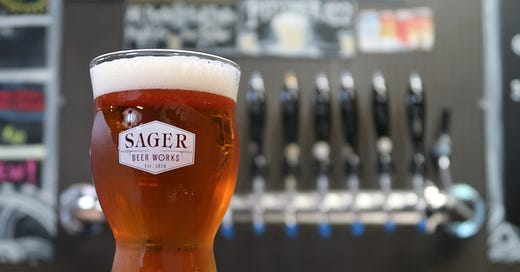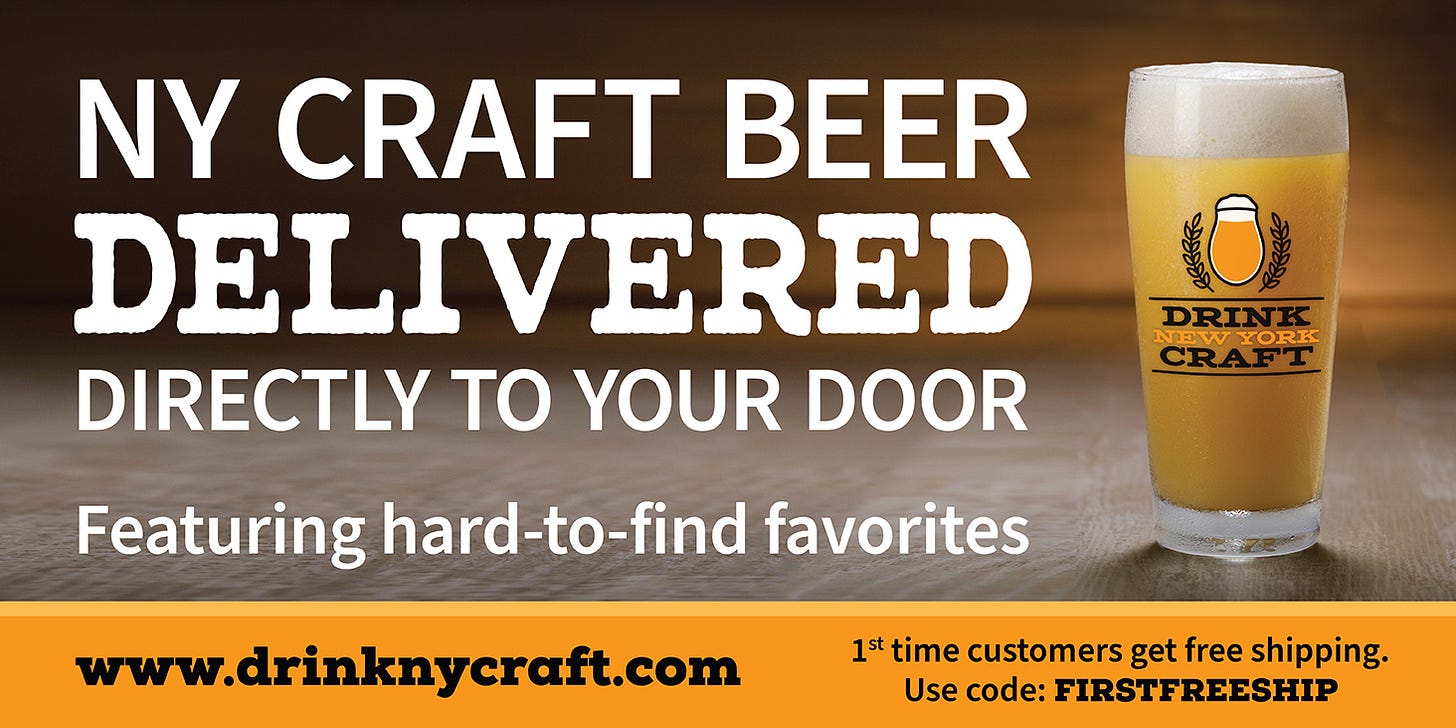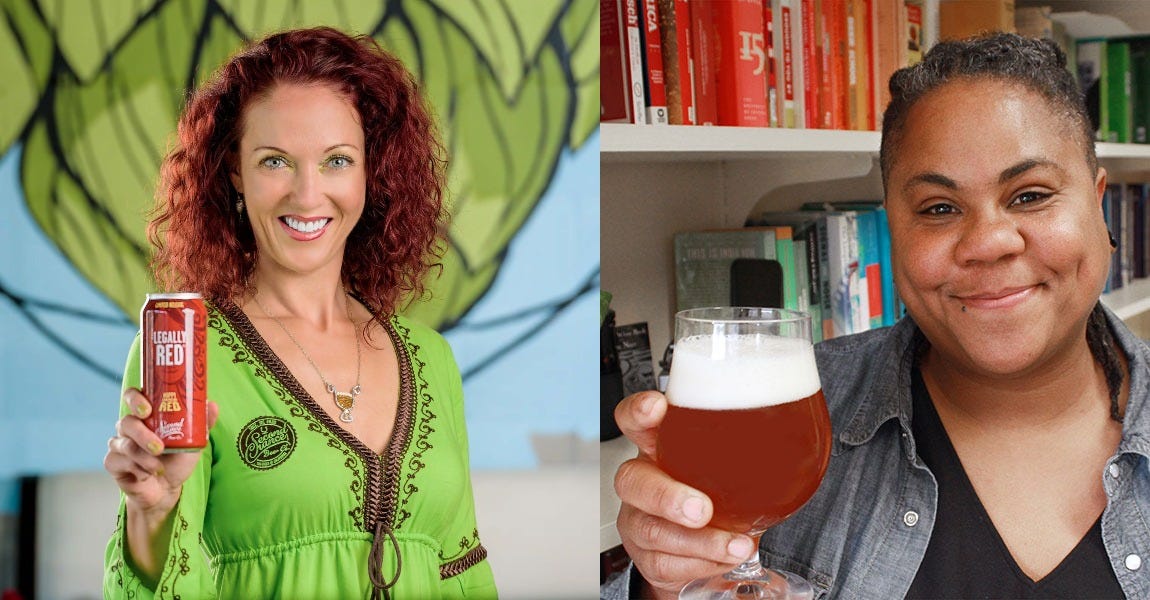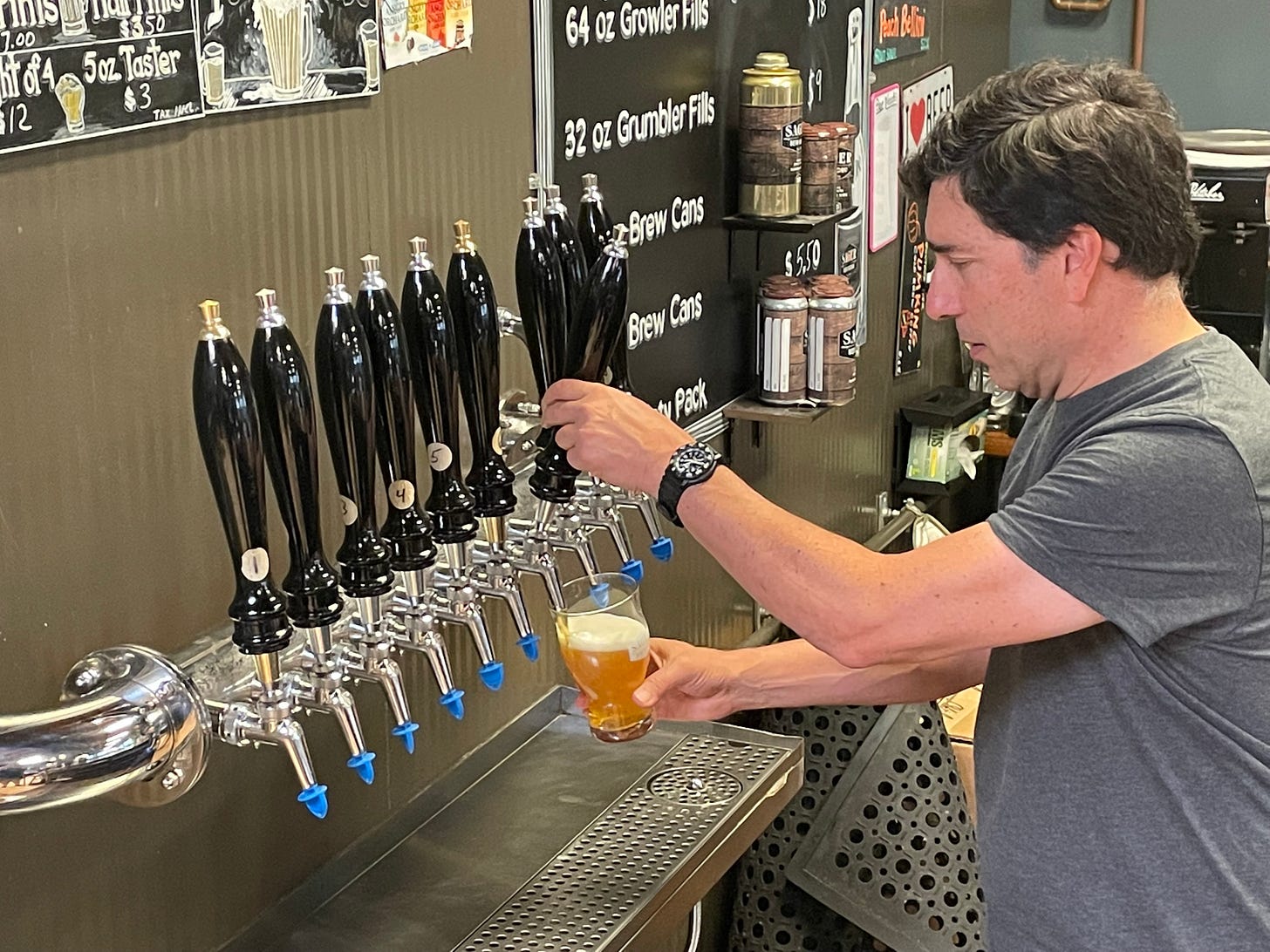Brewers Association works to diversify craft beer with help from Sager Beer Works
Paul Guarracini, owner/brewer of Sager Beer Works in Rochester, volunteers as mentor with BA's diversity mentorship program
Note: This newsletter is supported by Donnelly’s Public House, a wonderful canal-side establishment in the village of Fairport.
Paul Guarracini, the co-founder and head brewer of Rochester’s Sager Beer Works, envisions a craft beer industry where everyone, regardless of identity, feels welcome.
He maintains this perspective for two foundational reasons: 1. Beer is more fun when more people are involved and more voices are uplifted; 2. It’s fun. So for the past two years, Guarracini has volunteered as a mentor through the Colorado-based Brewers Association mentorship program.
The program provides professional development opportunities for folks seeking to join or advance in the industry. Put simply, “The program seeks to increase the diversity of the workforce, leadership, and ownership of small and independent breweries by providing structured mentoring and advocacy to those experiencing barriers to access or advancement in the industry.”
Guarracini provides insight in business strategy and planning, not something he was ever formally trained in, but something he has been doing for years — first at Fairport Brewing and then at Sager, which he opened with partner Don Tumminelli in 2018. Through three cycles, he’s worked with 15 budding entrepreneurs. Another session begins next month.
“It’s about giving back,” said Guarracini, 62, who retired from Eastman Kodak Co. to focus on brewing full time. “It’s funny, because when you teach, you always learn.”
Beer has always been something to share, Guarracini said, whether it be the beverage itself or the knowledge he’s gained from opening two breweries. From his time as the president of the Upstate New York Homebrewers Association more than a decade ago until now, Guarracini, a loquacious and engaging presence, just wants to share.
“These are efforts that are hopefully getting more people under the tent,” Guarracini said. “That’s another concern of mine. The tent has got to get bigger if the craft beer industry is going to get bigger. We need to expand. It’s absolutely the right thing to do. That’s a big interest (for me), just generally wanting to give it away and help the industry in general.
“The folks I’m dealing with, my mentees, are quite a variety of folks. I’ve had folks who want to open breweries with a real strong social good to them. Others just see an unmet need and they want to open a brewery. They are generally not young, white males with beards and flannel shirts. That’s not the crowd I get and I don’t care. They all have some of the same challenges.”
Talk to enough people about craft beer and you’re bound to hear the industry described as a “tent,” which is fitting since it embodies and enhances the idea of beer as a social beverage. The tent could be a beer garden. It could be a festival. And the goal is keep growing the size of the tent as you welcome more and more people underneath it.
Advertisement: Drink NY Craft is a wonderful service that makes it super easy to have some of the best beer in the state delivered right to your front door. Details here.
Why should we care?
If the beer is tasty and the experience is pleasant inside a taproom, most people are satisfied. But increasingly, many inside the industry have questioned why craft beer is dominated by white cisgender men. And then they’ve been considering ways to open up the industry to more and more folks.
Photo (provided): Virginia Morrison, CEO of Second Chance Beer Co., left, and Dr. J Beckham-Jackson, the BA’s equity and inclusion partner, help lead the Brewers Association’s diversity efforts.
Dr. J Beckham-Jackson has been at the center of many of those conversations. Believing that the world can be changed over a beer or two, Beckham-Jackson became the Brewers Association’s first diversity ambassador in 2018. Dr. J, who founded a professional development platform called Crafted For All and a nonprofit called Craft x EDU, now leads the BA’s Diversity, Equity, and Inclusion department as its equity and inclusion partner. During her academic career, she studied American beer and now devotes her energy to rewriting the future of the industry.
And Virginia Morrison, CEO and co-owner of San Diego-based Second Chance Beer Co. in San Diego and a Brewers Association board member who chairs the Diversity, Equity, and Inclusion committee, is another leading advocate in this movement.
As a person who is already comfortably under the tent (and recognizing my privilege to stand in that position), I asked Virginia and Dr. J why should I care about diversifying beer?
“Craft beer, we love it so much not because we sit at home and enjoy it by ourselves, it’s the community,” Morrison offered. “It’s about being out in spaces and places where we can commune with other people and connect. Really, some of the best ideas come out of brewery tasting rooms. The science is really solid that diversity in spaces like that makes for greater connection, greater understanding, more open minds, better ideas, and just happier times. That has certainly been my experience.”
Dr. J said she most often hears that question from consumers, noting that “brewers get it.”
“I wanna say to consumers, the people who make your beer really care about it,” Beckham-Jackson added. “They care about it for a number of reasons. First, I think it’s completely fair to say there is a financial imperative to do so. This is a competitive marketplace and it makes sense to cultivate new markets. For the financial stability of the industry moving forward, it’s just a no-brainer.
“And I think there is a bit of an innovation imperative. We’re an industry predicated on always doing new things and always producing what’s new or what’s old in a new format, going to different places and mining different influences. In order to continue being innovative and relevant, we need more perspective and we need more people to be in there. You should care because it’s precisely what this industry is about.”
Let’s reach more folks!
In Rochester, BA-provided statistics indicate women make up around 35 percent of the craft-drinking public, a figure that lags behind the state average of roughly 45 percent. The Rochester total, however, is ahead of the national average, which is still below 30 percent.
Research also shows there is still plenty of room to reach older generations, with millennials representing about 33 percent of the craft market in Rochester. And there is a golden chance to diversify beer by reaching more people of color. In Rochester, white people make up more than 95 percent of the craft drinkers, according to the BA.
Through an industry survey in 2021, the BA determined 93.5 percent of breweries nationwide are owned by white people. While men own more than 75 percent of the breweries.
Female drinkers under the age of 25, however, now outnumber male drinkers under 25, according to Brewers Association chief economic Dr. Bart Watson, He concluded, “So for craft to continue growing and moving more in the larger beer and beverage alcohol consumer market, it will need to connect better with that diverse customer base. While there’s nothing that says white and male owned businesses can’t connect with that more diverse customer base, it’s going to require additional work in building diverse organizations and shoring up blind spots.”
The work is just beginning
The BA is playing a leading role in diversifying craft beer. It first convened its DEI committee in 2017. But it is hardly the only group working in the space. Nonprofits like Beer Kulture and Beer is for Everyone are just two of the organizations seeking to uplift more voices and educate different communities about beer. The New York State Brewers Association, through a committee, surveys, and educational materials and programs, is also trying to make the industry into a more welcoming place.
So in a lot of ways, this DEI movement is still in its infancy. It’s not a short-term fix and it won’t yield results overnight. But that was never the goal, because it’s an ongoing conversation. Because they only knew the industry lacked diversity anecdotally, a big effort was made to collect data. With this data in hand, Dr. J said the BA launched a diversity and inclusion events grants program in 2019. And in the subsequent years, the DEI committee has been expanded into four different subcommittees to expand its reach and scope.
Photo: Sager Beer Works head brewer/co-owner Paul Guarracini pours a pint of his Sager Saxon IPL inside his Rochester taproom.
How the program works
The mentorship program was ready to launch in 2019 as a face-to-face experience. It had to be reconfigured in 2020 after the pandemic paused just about everything.
Morrison said the pandemic has actually strengthened the mentorship program by allowing people from across the country to connect remotely. Instead of having a regional focus where someone from Rochester might be paired with someone from Buffalo, mentors are now working with people hundreds, if not thousands, of miles away.
And the program keeps growing as more applications are received and more mentors participate. The program, which is completely free for mentees, offers three different tracks — one for aspiring professionals (those who have never worked in the industry), another for advancing professionals (those already working in the industry and seeking a path for advancement), and a start-up track for those looking to open breweries.
Each mentee works with five different mentors as the program is designed for broad access. And the mentor list is wildly impressive, including such industry heavyweights as Allagash head brewer Jason Perkins and Schlafly Beer CEO Fran Caradonna.
“We want to see the barriers that people are experiencing and make an intervention in their lives,” Beckham-Jackson said.
Jeff Boyda is looking to open Omnus Brewing in Downingtown, Penn. He currently works for a craft beer distributor in Chester County and completed the mentorship program in May.
“I had a great opportunity to really meet people in the industry,” Boyda said. “For me, it was unique, because the program is specifically for marginalized people in the industry. I knew that to be true. But one of the big pushes of brewery I’m launching is to be more inclusive and strategically implement programs that bring in marginalized people, like women, people of color, people from the LGBTQ+ community. That’s what I put in my application video. I know I’m a bearded white guy. I can’t change that. But I have an intention and a desire to see the industry move forward.”
A brewer gives back
Each mentee is given roughly 10 hours of Guarracini’s time. And after they work with him, most often via Zoom, they are assigned to another mentor who focuses on another area. He focuses on basic, fundamental questions for those opening breweries, everything from what to buy, how to estimate realistic start-up costs, how to hire, how to figure out how many seats and taps you might need, and how to write a business plan.
“My job is to fill their tank,” Guarracini said. “Whatever they got, whatever they need. It’s a lot of fun.”
One of those mentees, Boyda, said Guarracini was “very forthright with any questions I had. He shared everything with me — the hard things, the fun things, the great things, all of that kind of stuff.” Boyda said he is approaching his forthcoming brewery with a “CEO mindset,” where he is trying to surround himself with driven, like-minded individuals. That means employing inclusive hiring practices and building something that benefits everyone involved.
“I feel like this program really set me up to be successful,” Boyda said. “The program gave me an opportunity to realize some of the things I don’t know.”
Guarracini has worked with folks from all over the country but most seem to be concentrated on the East Coast. Guarracini developed materials he shares with mentees and bases everything on his experiences, showing what he has encountered in his 10 years as a professional brewer. He encourages those he has mentored to reach back out with questions long after the program ends.
“I think it’s a lot of fun,” Guarracini said. “It’s one thing I can do, one thing Sager can do, to add something. When you’re really tiny, you don’t have any resources. The biggest resource I have is knowledge. I think that education and knowledge is the right way forward. If every brewery was trying to teach people, teach consumers, other places, suppliers and other brewers, we’re gonna make a lot of progress. It’s not about how much money you’re spending. The small guys don’t have that kind of stuff. But we do have energy, knowledge, time.”
Emily Richards, co-founder of Brooklyn’s forthcoming Simple Brewing Co., said the start-up track was perfect for her project. She was exceedingly effusive when offering praise for Guarracini. Since both breweries will be in New York, Guarracini offered invaluable perspective on laws and regulations
“He was probably my favorite mentor,” Richards said. “At the end of the program, we’re able to request more mentorship time with one of our mentors and he’s the one I requested more sessions with. He was amazing and wonderful and worth it. I am so glad he chose to do this. The connections and knowledge, I don’t even know where I would find that elsewhere. It’s so unique.”
This program at least gives people a better foundation to ascertain whether or not this is the right path for them. And Guarracini would like to see the program take root in Rochester. He’s hopeful future participants could come from the Rochester region.
“I am looking forward to visiting these places I helped,” Guarracini concluded. “You’ve got to educate folks who are not under the tent and find out why they’re not under the tent. It’s hard to come under the tent when you don’t know anything about the product and the culture. You have to start with the basic like, ‘What is beer?’ The people starting these breweries are way beyond that. But it always comes back to that educational question and the barrier, because it’s hard to get excited about something you know nothing about.”


Title sponsor: Donnelly’s Public House
This work is made possible through support from Donnelly’s Public House, 1 Water St. in Fairport. So make sure to get out to Fairport and support one of the best establishments in our area.
I remain open to sponsorships, sponsored content, and advertisements, especially if it’ll keep the newsletter free for readers. And if you have information about upcoming releases, events, or happenings, don’t hesitate to reach out. For more information, feel free to drop me a line at clevelandprost@gmail.com.
And if you enjoyed this edition of the Cleveland Prost, please subscribe and share! See you again soon.








